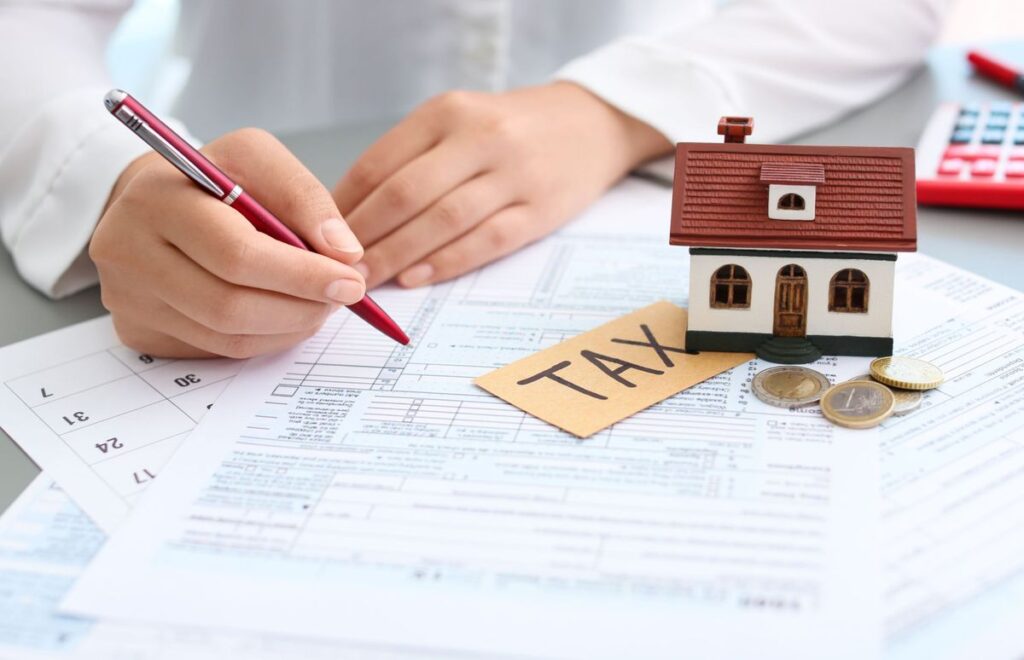
Tax on property in Pakistan is the most crucial yet neglected topic among real estate enthusiasts. Investors are often seen as ignorant regarding the tax implications on their assets, which later cost them in bulk fines. To make things straight, the FBR (Federal Board of Revenue) has tightened up the laws and revised the tax policies on buying and selling property in Pakistan. Making things easier to understand regarding the tax on property in Pakistan, this blog is crafted through experts’ insightful information, making real estate buyers and sellers aware of current tax policies running in our country.

Types Of Tax On Property In Pakistan
In Pakistan, several property taxes are levied to regulate and gather revenue from real estate dealings. The three primary components of property taxes are capital gains tax (CGT), withholding tax, and capital value tax (CVT). To gain a deeper understanding, let us analyze each type.
1. Capital Value Tax (CVT):
The capital value tax is the property tax imposed on the sale and transfer of immovable properties such as land, buildings, houses, & plots.
Rates (as of Budget 2022-2023):
- 5% for plots and files
- 10% for construction
- 15% for high-rise apartments
2. Withholding Tax:
Withholding tax is applied to property transactions and is withheld at the source, often on interest or dividends.
Rates (as of Budget 2022-2023):
- 1% for plots and files
- 5% for construction
- 2% for high-rise apartments
Changes (Budget 2023-2024):
- Filers: 3% (previously 2%)
- Non-filers: 6% (previously 4%)
3. Capital Gain Tax (CGT):
CGT is a tax on the proceeds from selling assets like stocks, real estate, and structures.
Rates (as of Budget 2022-2023):
- 5% for plots and files
- 10% for construction
- 15% for high-rise apartments
- Conditions for Exemption:
- Plots/files: Exempt after 6 years
- Houses: Exempt after 4 years
- High-rise properties: Exempt after 2 years
- CGT Rates based on Holding Period (for plots/files, houses, and high-rise properties):
- Varying rates for different holding periods, with no CGT after a certain number of years.
Every tax contributes to the broader fiscal framework controlling real estate transactions in the nation, with its own rate structure and exemption requirements.
How Impactful Is Property Tax in Pakistan on the System?

The main domains where significant impact is observed are collecting property tax in Pakistan and implanting smooth tax policies among citizens.
Promoting Fiscal Discipline: As seen by the higher 2023–2024 budget rates, property taxes are vital to Pakistan’s ability to maintain fiscal restraint. The government can meet budgetary needs and invest in vital national programs like public services and infrastructure development because of the higher tax rates.
Encouraging Filer Status: The new Property Tax Laws Pakistan structure offers significantly lower tax rates for this group, encouraging people to file. This calculated action aims to increase the tax base and promote compliance because the higher rates may be less attractive to non-filers. The government’s initiative to increase filers improves accountability and openness in the real estate industry.
Balancing Market Dynamics: Although buyers, particularly those who do not file taxes, may initially be hesitant, the higher tax rates also help to stabilize the market. These taxes on property in Pakistan can prevent artificial inflation of property values and preserve a more sustainable real estate market by discouraging speculative investments and encouraging a more methodical approach to property transactions.
National Revenue Boost: The fact that property taxes provide substantial cash for the government is one of the main justifications for their importance in Pakistan. The government can better solve economic issues, provide public services, and carry out development projects thanks to the additional revenue from these taxes, which eventually promotes economic growth and prosperity across the country.
How Do You Calculate Tax on Property in Pakistan?
Calculating the FBR tax on property in Pakistan is quite simple. All you have to follow is this formula:
Property Tax = (Rental Value of Property x Tax Rate) / 100
Property Tax Laws Pakistani rates vary based on the property type (residential, commercial, industrial, or agricultural). They might range from 2% to 5%. By matching tax obligations to different kinds of properties for sale in Pakistan, this variable taxation guarantees a sophisticated approach to real estate.
How do I pay tax on property in Pakistan?

For a smooth payment system for tax on property in Pakistan, visit the Federal Board of Revenue’s website. Select the kind of property tax you have to pay. Choose the payment method & make the tax payment easily from the comfort of your home!
Exempted Units From Property Taxes
- Single-family homes with less than five marlas of land are exempt.
- Properties are exempt if their annual rent is less than PKR 4320.
- Single-owner homes with an annual rent of less than PKR 6480 are excluded.
- Exempt are buildings owned by widows, orphans, and disabled people with annual taxes under PKR 12150.
- A retired government employee is entitled to an exemption for one residential home up to one kanal.
- Buildings owned by the government or local authorities are excluded.
- Religious structures, such as mosques, are excluded.
- Tax exemptions include public playgrounds, parks, schools, boarding homes, hostels, libraries, and medical facilities.
Final Verdict
Property tax laws in Pakistan are vital for promoting fiscal discipline, encouraging filer status, balancing market dynamics, and substantially boosting national revenue. The 2023–2024 budget adjustments reflect a strategic approach to aligning these taxes with broader economic objectives and ensuring the sustainable development of the real estate sector. However, technological advancements with easy calculation methods and swift payment procedures have made the system smoother and upgraded property tax policies in Pakistan.



Leave a Reply